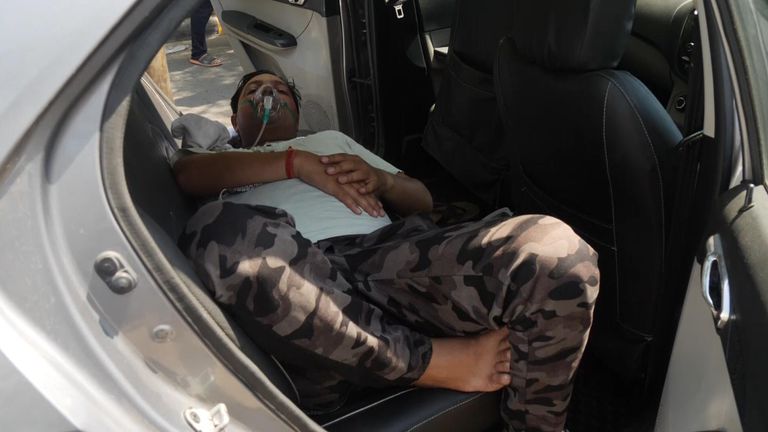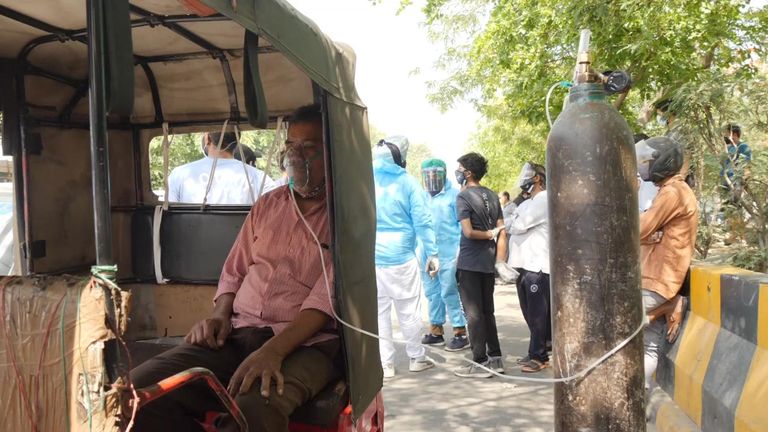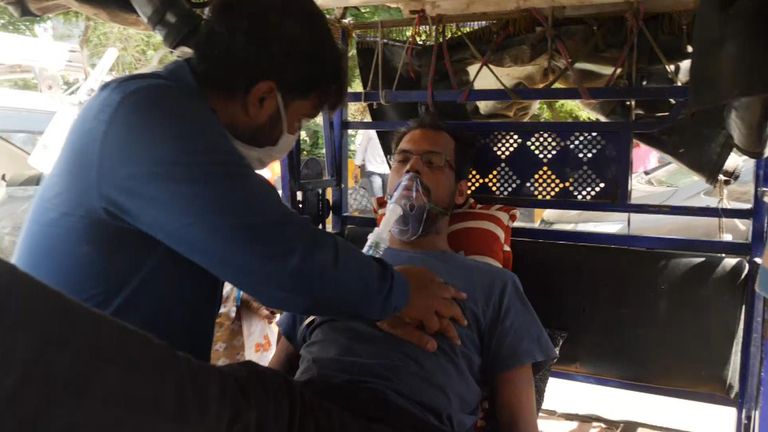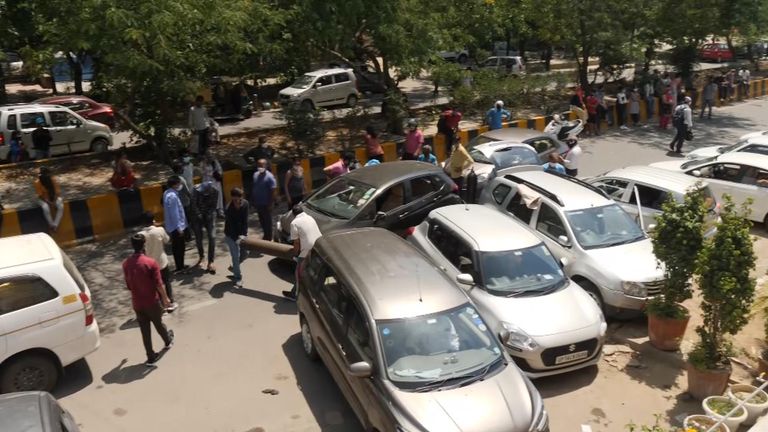Monday, 26 April 2021
US-Mexico border: Footage shows terrifying moment mother and two children lowered down 30ft wall by rope
Poilão Island, Guinea Bissau: the turtle sanctuary of West Africa

Accompanied by a Park Guide, we arrive at daybreak and wait in the darkness of the night with no noise, lights or movement for a shadow to emerge from the seas and slowly climb up the beach. These enormous creatures of marine life calmly look for the best place to leave their eggs and, having decided on the place, begin a beautiful rhythmic dance of their front legs that digs a hole in the sand. Tired with the effort, the turtles remain in a kind of trance while they deposit their eggs in the hole, at the rhythm determined by nature. They then cover the hole so as not to leave any clues for predators that eagerly seek these eggs to feed themselves, such as flounders, crabs or birds. In this process, which can last up to two hours or more, the turtle tries to leave the spawning site intact before venturing out to sea again.
Delighted with this unique moment, we are left with the proof of its passage in the long tracks that it leaves on the sand. But that’s not all. We also have the beauty of the occlusion of the eggs matured by the days and the temperature of the sand that determines the sex of the turtles that are born.

They are small, energetic and full of strength and determination to succeed in life. They are born at night and are guided by the light of the moon to the sea. Some are lost on the way, others die in the water, but there are always those that survive, those that struggle insignificantly against an immense sea where they again become easy prey.
The last time I saw turtles in Poilão was on a beautiful full moon night at the beginning of this year. Believe me; in this troubled time of pandemic, death, fear and anxiety, there is no better antidote or balm than to see a spectacle like this. Seeing wildlife happening ‘in front of us’, on this sacred island in the middle of the Atlantic, makes us forget for a moment that the world is today a dangerous place to dream and live. Poilão and its turtles bring back hope in a better world.

………………………………………………………………
People left to beg and barter for air as India’s coronavirus crisis becomes a frantic hunt for oxygen
Citizens are feeling abandoned during the overwhelming second wave of coronavirus in India, Sky's Alex Crawford finds.
There’s shouting. There’s pleading. There’s crying. And there’s death.
Dozens of vehicles were crammed into a narrow road outside a Sikh temple in the east of the Indian capital, New Delhi.
They were all full of sick or dying people desperate to get hold of oxygen.
Almost certainly, most of them should be in hospital receiving specialist treatment from trained professionals.
Instead, as India registered a new global record for the most number of infections in a day on Sunday – for the fourth day in a row – they were reduced to sucking air from bottles of oxygen on the street provided free by a Sikh charity.
Many arrived at the temple folded into a car seat or curled up at the rear of a rickshaw.
Some were already unconscious, while others were bent over, working hard to draw breath.
Many of the parked vehicles had tubes hanging out of the windows, attached to huge tanks which are now people’s lifeline.

This wasn’t the site of a hospital. It wasn’t an official government-organised oxygen provider. This was a voluntary outfit run by the Sikh Khalsa Help International charity.
While hospitals in the capital raised the alarm over oxygen running out for the seventh day running, people were racing to volunteers who had managed to source small amounts of oxygen.
“I don’t know what the government is doing,” said founder Gurpreet Singh. “If we can do this, why can’t they?”
It is a fair enough question many people across India are asking about these entrepreneurial outfits which are managing to do whatever they can to help their fellow Indians.
For citizens who are feeling for the most part abandoned during this overwhelming second COVID-19 wave, any help is being hungrily grasped with some gratitude.

Siddiqui Ahmad had brought his 32-year-old son to beg for air. “He’s been turned away from everywhere,” his mother sobbed to us. “No one would help.”
Indians across the country have been reduced to bartering, begging for or borrowing air.
The couple’s son, Abu Sadat, is looking very weak and motionless in the back of the tut tut they have arrived in. Siddiqui is pleading with the over-pressed volunteers to tend to him – and quickly.
They jump into action and drag an oxygen tank to him and hook him up. His parents breathe gulps of relief as their son finally has the best chance of survival in more than eight days – but it is short-lived.
Within minutes there’s a panic as he seems to lapse into unconsciousness. His younger brother Faraz is busy pumping his chest to try to jerk him back into life. Abu Sadat is looking very dazed, very weak but he is alive and with the oxygen mask firmly fixed on his face.

His brother keeps on slapping his cheeks, trying to make him more alert. They – like all the families here – don’t want to lose any more loved ones to this deadly disease. They’re fighting but there’s a growing feeling they are being left to fight this virus without the tools to do it.
Britain has announced it is sending more than 600 pieces of life-saving medical equipment which will arrive on Tuesday.
The EU and America have both said they are ready to help – but the people on the ground have yet to see any substantial help from their own government or other countries.

We watched as a young man burst into tears before he’d managed to get any help for what looked like his older brother in the back of his car.
“He’s expired,” said the driver in the front, looking visibly shocked. “He’s no longer here.”
It would be shocking enough just on its own – but this is a scene being played out multiple times across this huge and massively populous country.
Tragedy upon tragedy – and showing no sign of abating.
………………………………………………………………
Egypt extends state of emergency for 3 months
Egypt’s health ministry said on Friday it sent reinforcements and equipment to the governorate of Sohag after medical staff complained of a shortage of resources to cope with a surge in coronavirus cases.
The reported rise of cases in the governorate, nearly 400km (250 miles) south of the capital Cairo, has raised concern about a third wave of COVID-19 infections in Egypt, where most restrictions on movement and other precautions were lifted after a first wave last summer.
Deployments to Sohag include teams to conduct home visits and supplies of oxygen and ventilators, while hospitals have expanded admission capacities, a ministry statement said.
The statement followed complaints on social media alleging dire shortcomings in public health services and access to treatment amid a rapid rise in COVID-19 infections in the area, including critical cases and deaths. The ministry denied the claims.
Egypt had recorded about 220,000 confirmed coronavirus cases and nearly 13,000 deaths. Infections have risen in recent weeks around the start of the Muslim holy month of Ramadan.
Experts say official numbers reflect only a fraction of the actual cases because the level of testing in Egypt has been relatively low and private tests are not included in government statistics.
State of emergency
It was the sixteenth extension of the state of emergency since it came into effect on April 10, 2017, a day after attacks on two Coptic churches on Palm Sunday that killed at least 44 people.
The armed group ISIL (ISIS) claimed responsibility for the attacks, which also wounded more than 100 people and occurred a week before Coptic Easter, with Pope Francis scheduled to visit Egypt later that month.
The assault was the latest on a religious minority increasingly targeted by the group and was considered a challenge to el-Sisi who had pledged to protect Egypt’s Christian minority.
Egypt’s state of emergency has allowed the authorities to make arrests and search people’s homes without warrants.
………………………………………………………………
Major malaria vaccine breakthrough in Burkina Faso trial
………………………………………………………………
Germany faces lockdown until June
An Oscars unlike any other to get underway Sunday
Show producers are hoping to return some of the traditional glamor to the Oscars, even in a pandemic year. The red carpet is back, though not the throngs; only a handful of media outlets will be allowed on site. (E! red carpet coverage starts at 3 p.m.) Casual wear is a no-no. The pre-show on ABC begins at 6:30 p.m. EDT and will include pre-taped performances of the five Oscar-nominated songs. The ceremony is available to stream on Hulu Live TV, YouTubeTV, AT&T TV, FuboTV and on ABC.com with provider authentication.
Pulling the musical interludes (though not the in memoriam segment) from the three-hour broadcast — and drastically cutting down the time it will take winners to reach the podium — will free up a lot of time in the ceremony. And producers, led by filmmaker Steven Soderbergh, are promising a reinvented telecast.
The Oscars will look more like a movie, Soderbergh has said. The show will be shot in 24 frames-per-second (as opposed to 30), appear more widescreen and the presenters — including Brad Pitt, Halle Berry, Reese Witherspoon, Harrison Ford, Rita Moreno and Zendaya — are considered “cast members.” The telecast’s first 90 seconds, Soderbergh has claimed, will “announce our intention immediately.”
But even a great show may not be enough to save the Oscars from an expected ratings slide. Award show ratings have cratered during the pandemic, and this year’s nominees — many of them smaller, lower-budget dramas — won’t come close to the drawing power of past Oscar heavyweights like “Titanic” or “Black Panther.” Last year’s Oscars, when Bong Joon Ho’s “Parasite” became the first non-English language film to win best picture, was watched by 23.6 million, an all-time low.
Netflix dominated this year with 36 nominations, including the lead-nominee “Mank,” David Fincher’s black-and-white drama about “Citizen Kane” co-writer Herman J. Mankiewicz. The streamer is still pursuing its first best-picture win; this year, its best shot may be Aaron Sorkin’s “The Trial of the Chicago 7.”
But the night’s top prize, best picture, is widely expected to go to Chloé Zhao’s “Nomadland,” a contemplative character study about an itinerant woman (Frances McDormand) in the American West. Should it be victorious, it will be one of the lowest budget best-picture winners ever. Zhao’s film, populated by nonprofessional actors, was made for less than $5 million. (Her next film, Marvel’s “Eternals,” has a budget of at least $200 million.)
Zhao is also the frontrunner for best director, a category that has two female filmmakers nominated for the first time. Also nominated is Emerald Fennell for the scathing revenge drama “Promising Young Woman.” Zhao would be just the second woman to win best director in the academy’s 93 years (following Kathryn Bigelow for “The Hurt Locker”), and the first woman of color.
History is also possible in the acting categories. If the winners from the Screen Actors Guild Awards hold — “Ma Rainey’s Black Bottom’s” Chadwick Boseman for best actor, Viola Davis for best actress; Yuh-Jung Youn (“Minari”) for best supporting actress; and Daniel Kaluuya (“Judas and the Black Messiah”) for best supporting actor — it would the first time nonwhite actors swept the acting categories — and a dramatic reversal from recent “OscarsSoWhite” years.
Several of those awards appear to be locks, particularly for the late Boseman, who would become the third actor to ever win a posthumous Academy Award following Peter Finch and Heath Ledger. Taylor Simone Ledward, Boseman’s widow, has often accepted previous honors on his behalf.
If there’s one less certain category, it’s best actress. Davis, who has won previously for her performance in “Fences,” is up against Carey Mulligan (“Promising Young Woman”) and two-time winner McDormand. Prognosticators call it a three-way toss up.
Sunday’s pandemic-delayed Oscars will bring to a close the longest awards season ever — one that turned the season’s industrial complex of cocktail parties and screenings virtual. Eligibility was extended into February of this year, and for the first time, a theatrical run wasn’t a requirement of nominees. Some films — like “Sound of Metal” — premiered all the way back in September 2019.
The pandemic pushed several anticipated movies out of 2020, but a few bigger budget releases could still take home awards. Pixar’s “Soul” appears a sure-thing for best animated film, and Christopher Nolan’s “Tenet” — which last September tried to lead a moviegoing revival that fizzled when virus cases spiked and many theaters couldn’t reopen — will likely win for its visual effects.
But for the first time, Hollywood’s most prestigious awards will overwhelming belong to films that barely played on the big screen. The biggest ticket-seller of the best picture nominees is “Promising Young Woman,” with $6.3 million in box office.
Lately, with vaccinations expanding, signs of life have begun to show in movie theaters — most of which are operating at 50% capacity. Warner Bros.′ “Godzilla vs. Kong” has made around $400 million worldwide, which theater owners point to as proof that moviegoers are eager for studios to again release a regular diet of big movies. Right now, the date circled on cinema calendars is May 28, when both Paramount’s “A Quiet Place Part II” and Disney’s “Cruella” arrive in theaters — though “Cruella” will simultaneously stream for $30.
But it’s been a punishing year for Hollywood. Around the world, movie theater marquees replaced movie titles with pleas to wear a mask. Streaming services rushed to fill the void, redrawing the balance between studios and theaters — and likely forever ending the three-month theatrical exclusivity for new releases. Just weeks before the Oscars, one of Los Angeles’ most iconic theaters, the Cinerama Dome, along with ArcLight Cinemas, went out of business.
After the pandemic, Hollywood — and the Oscars — may not ever be quite the same. Or as WarnerMedia’s new chief executive Jason Kilar said when announcing plans to shift the studio’s movies to streaming: “We’re not in Kansas anymore.”
………………………………………………………………
Derek Chauvin Sentencing Date Set After Murder Conviction
Police arrests 150 suspected criminals at ‘The Event Hub’ in Accra
The arrest was effected by police officers from the National Police Operations Department, led by ACP Mr. Kwasi Arhin, Director and Operations.
According to the police, the exercise is part of a move to use intelligence-led operations to rid the city of criminals.
The police also disclosed that the arrested persons included 15 females.

This was contained in a communiqué issued by the Service today, Sunday, April 25, 2021.
The suspects are between the ages of 19 and 25 and were arrested with assorted items.

They include unregistered vehicles and motorbikes; parcels of white substances and dried leaves believed to be narcotic drugs and mixtures of suspected codeine and laptop computers.
The police further assured the public that it will continue to adopt strategies to rid communities of criminals, in a bid to prevent crimes and ensure law and order in the country.
It also urged the general public is to assist the Police with information on criminal activities.
It thus asked the public to call 191 and 18555 in cases of emergency.

………………………………………………………………
A Royal Encounter at Madame Tussauds London - Part 7
Exploring the Majesty of the Palace and Its Distinguished Guests Greetings, ladies and gentlemen! My name is Sofonie Dala, and I am deligh...

-
Since the July 26 coup, Niger has become the latest hotbed of disinformation in the troubled Sahel region as West African powers grapple wit...
-
Angolan President of Republic João Lourenço marked Saturday (26) the third year of his five-year in office, marked by the strong negative ...
-
Celebrating Purpose, Passion & Powerful Public Engagements! Dear Changemakers, As we reach the midpoint of 2025, we’re thrilled to sha...










